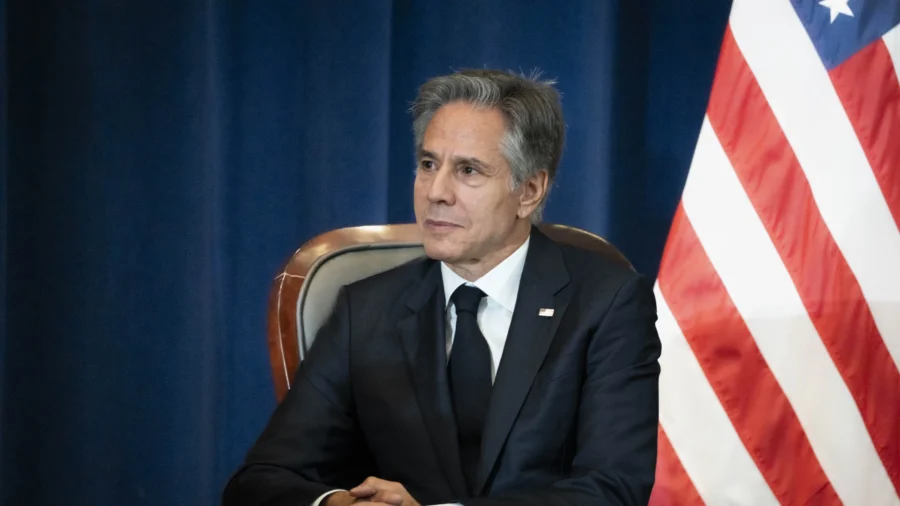U.S. Secretary of State Antony Blinken has dismissed claims that the $6 billion in Iranian funds set to be unfrozen as part of a U.S. prisoner swap deal could have helped Iran fund Hamas’s attack on Israel.
“The facts are these: No U.S. taxpayer dollars were involved,” Mr. Blinken said in a statement. “These were Iranian resources that Iran had accumulated from the sale of its oil that were stuck in a bank in South Korea. They have had from day one, under our law, under our sanctions, the right to use these monies for humanitarian purposes. They were moved from one account to another in another country to facilitate that use.”
“As of now, not a single dollar has been spent from that account,” he added. “And again, the account is closely regulated by the U.S. Treasury Department, so it can only be used for things like food, medicine, [and] medical equipment. That’s what this is about. And by the way, the previous administration set up a very similar mechanism to enable Iran to use its oil proceeds that were blocked in various places or stuck in various places for humanitarian purposes.”
Mr. Blinken’s remarks come after some Republicans argued that the Biden administration’s move to free up resources for Iran could embolden the country to further aid terrorist groups such as Hamas.
Republican presidential candidate Nikki Haley, meanwhile, has rejected Mr. Blinken’s defense in an interview with NBC’s “Meet the Press,” arguing that even if there are conditions on how Iran can spend the specific $6 billion tranche of unfrozen funds from the prisoner exchange deal, the Iranian government can still free up funds from other places as a result of the deal.
“I actually think it was irresponsible for Secretary Blinken to say that the $6 billion doesn’t weigh in here,” Ms. Haley said. “Let’s be honest with the American people, and understand that Hamas knows, and Iran knows, they’re moving money around as we speak because they know $6 billion is going to be released. That’s the reality.”
Although Mr. Blinken has denied that the $6 billion in funds unfrozen under the deal were used in the group’s Oct. 7 surprise attack, he pointed out that other funds were likely used because Iran has “always used and focused its funds on supporting terrorism.”
“Iran has, unfortunately, always … done that when there have been sanctions, it’s done that [when] there haven’t been sanctions,” Mr. Blinken said in a separate statement. “And it’s always prioritized that. And again, I come back to the proposition that from—these funds have always been, under the law, available to Iran to use for humanitarian purposes.”
The U.S. State Department said in a report in 2020 that Hamas is among a number of Palestinian terrorist groups that have received up to $100 million annually from Iran. Another Iran-backed terrorist group in the region is the Palestinian Islamic Jihad, which has been behind a number of deadly attacks targeting Israeli civilians, Egyptian security forces, and American citizens.
What Was The $6 Billion?
The $6 billion was Iranian money that had been frozen in South Korean banks. After Washington, under former President Donald Trump, placed a total ban on Iran’s oil exports and sanctions on its banking sector in 2019, these Iranian oil revenues were blocked in Seoul.
Under the terms of the recent Iran prisoner deal, the money can only be used for humanitarian-related purposes, including purchasing food or other goods outside Iran for import, U.S. officials said.
In August, details were made public of an agreement that President Joe Biden approved in which five U.S. citizens detained by Tehran were allowed to leave the country in exchange for the $6 billion.
The attack on Israel, meanwhile, has left hundreds of people dead and thousands more wounded.
According to health officials in the Gaza Strip, at least 770 Palestinians in the coastal enclave have died as a result of the conflict as of early on Oct. 10. In Israel, at least 1,000 people have died, and health authorities in the country reported that thousands more wounded Israelis are under medical treatment in hospitals.
The Israeli military said on Oct. 9 that it had called up an unprecedented 300,000 reservists and was imposing a total blockade of the Gaza Strip, in a sign it may be planning a ground assault in response to the devastating weekend attacks by Hamas terrorists.
Reuters and Ryan Morgan contributed to this report.

